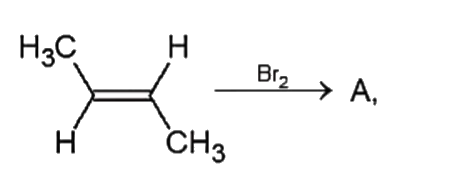Which of the following statements is true in aqueous medium?
CH2CH2S− is a stronger base and more nucleophilic than CH3CH2O−
CH3CH2S is a stronger base but is less nucleophilic than CH3CH2O−
CH3CH2S− is a weaker base but is more nucleophilic than CH3CH2O−
CH3CH2S− is a weaker base and less nucleophilic than CH3CH2O−
The correct Answer is:C
To solve the question regarding which statement is true in an aqueous medium concerning the basicity and nucleophilicity of the given species, we will analyze the two species: C2H5O^- (ethoxide ion) and C2H5S^- (ethanethiolate ion).
1. Understanding Basicity:
- Basicity refers to the ability of a compound or ion to donate its electron pair to an electrophile. The more electron-dense the species, the stronger the base.
- In our case, we have C2H5O^- and C2H5S^-.
2. Comparing Basicity:
- C2H5O^- has the negative charge on oxygen, which is more electronegative than sulfur. This means that oxygen holds onto its electrons more tightly, making it a stronger base.
- C2H5S^- has the negative charge on sulfur. Sulfur has a vacant d-orbital, which can delocalize the negative charge, reducing its basicity.
- Therefore, the order of basicity is:
C2H5O−>C2H5S−
3. Understanding Nucleophilicity:
- Nucleophilicity is the ability of a nucleophile to attack a positive center. In an aqueous medium, solvation plays a significant role.
- When these ions are in water, they become solvated. The more negative charge a species has, the more it will be solvated.
- C2H5O^- has a higher negative charge density than C2H5S^-. Thus, it will undergo more solvation, which decreases its nucleophilicity.
4. Comparing Nucleophilicity:
- Since C2H5O^- is more solvated, its ability to attack electrophiles decreases compared to C2H5S^-.
- Therefore, the order of nucleophilicity is:
C2H5S−>C2H5O−
5. Conclusion:
- We have established that C2H5O^- is a stronger base but a weaker nucleophile compared to C2H5S^-.
- The correct statement based on our analysis is:
- C2H5S^- is a weaker base but is more nucleophilic than C2H5O^-.
Final Answer:
The correct statement is: C2H5S^- is a weaker base but is more nucleophilic than C2H5O^-.
---
- Basicity refers to the ability of a compound or ion to donate its electron pair to an electrophile. The more electron-dense the species, the stronger the base.
- In our case, we have C2H5O^- and C2H5S^-.
- C2H5O^- has the negative charge on oxygen, which is more electronegative than sulfur. This means that oxygen holds onto its electrons more tightly, making it a stronger base.
- C2H5S^- has the negative charge on sulfur. Sulfur has a vacant d-orbital, which can delocalize the negative charge, reducing its basicity.
- Therefore, the order of basicity is:
C2H5O−>C2H5S−
- Nucleophilicity is the ability of a nucleophile to attack a positive center. In an aqueous medium, solvation plays a significant role.
- When these ions are in water, they become solvated. The more negative charge a species has, the more it will be solvated.
- C2H5O^- has a higher negative charge density than C2H5S^-. Thus, it will undergo more solvation, which decreases its nucleophilicity.
- Since C2H5O^- is more solvated, its ability to attack electrophiles decreases compared to C2H5S^-.
- Therefore, the order of nucleophilicity is:
C2H5S−>C2H5O−
- We have established that C2H5O^- is a stronger base but a weaker nucleophile compared to C2H5S^-.
- The correct statement based on our analysis is:
- C2H5S^- is a weaker base but is more nucleophilic than C2H5O^-.
The correct statement is: C2H5S^- is a weaker base but is more nucleophilic than C2H5O^-.
Topper's Solved these Questions
- TEST PAPERSBook:RESONANCE ENGLISHChapter:TEST PAPERSExercise:PT-01
Explore 30 Videos
- TEST PAPERSBook:RESONANCE ENGLISHChapter:TEST PAPERSExercise:Pt-02
Explore 30 Videos
- TEST PAPERSBook:RESONANCE ENGLISHChapter:TEST PAPERSExercise:PART - III CHEMISTRY
Explore 20 Videos
- SURFACE CHEMISTRYBook:RESONANCE ENGLISHChapter:SURFACE CHEMISTRYExercise:Section - 5
Explore 1 Video
- TEST SERIESBook:RESONANCE ENGLISHChapter:TEST SERIESExercise:CHEMISTRY
Explore 50 Videos
Similar Questions
Which of the following statements are correct?
View SolutionWhich of the following statement is true ?
View SolutionWhich of the following statement is true ?
View SolutionWhich of the following statement is true ?
View SolutionWhich of the following statement is true?
View SolutionWhich of the following statement is true ?
View SolutionWhich of the following statement is true?
View Solution
Which of the following statement is true ?
View SolutionWhich of the following statement is true ?
View SolutionWhich of the following statement is true?
View Solution

